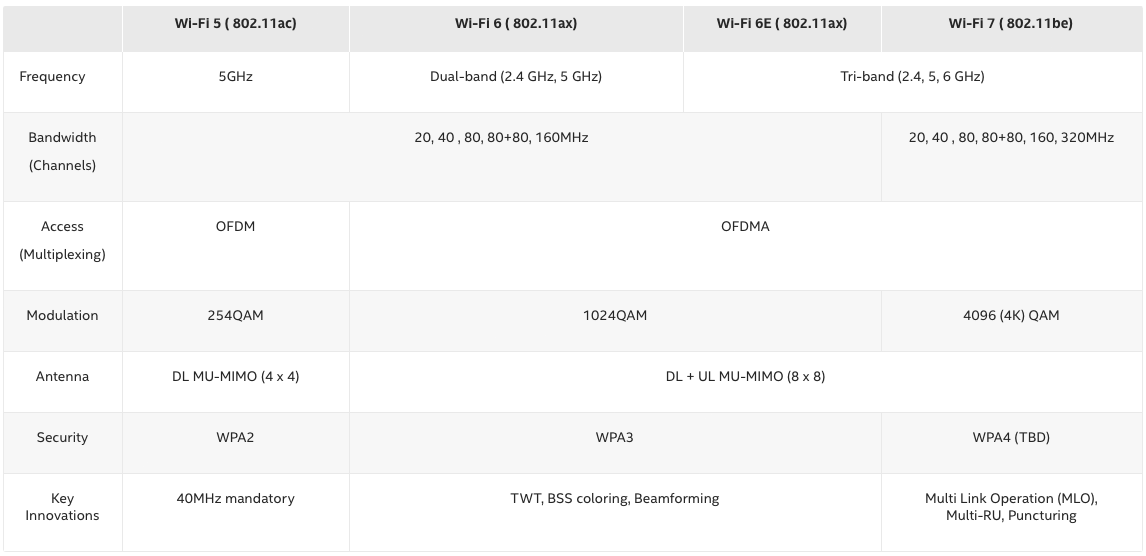Intel Plans to Bring Wi-Fi 7 to Client Platforms by 2024
Wi-Fi 7 is coming to client PCs near you in two years.
Being the world's No. 1 supplier of notebook platforms, Intel must adopt the latest technologies as soon as possible to maintain this lead. In addition, one of the key selling points of laptops is a fast Wi-Fi connection, so adopting the latest tech version is crucial for the CPU giant. As it turns out, Intel is poised to support Wi-Fi 7 by its client PC platforms by 2024.
"We are currently developing Intel's Wi-Fi '802.11be' in order to obtain the 'Wi-Fi Alliance' certification, and it will be installed in PC products such as laptops by 2024," said Eric McLaughlin, vice president of Intel's wireless solutions division, at a press conference in South Korea, reports ET News (via The Register). "We expect it to appear in major markets in 2025."
Wi-Fi 7 (also known as IEEE 802.11be) will offer a maximum raw aggregated bitrate of 40,000 Mbit/s (40 Gbit/s), which will make wired Ethernet connections obsolete for most users. However, in most cases, client devices will support considerably slower connections.
But to get such a high bitrate, Wi-Fi 7 clients and access points will have to use three bands — 2.40 GHz, 5 GHz, and 6 GHz — and increase channel width to 320 MHz as well as add 4096-QAM. Meanwhile, since Wi-Fi 7 will rely on technologies its predecessors introduced, things like mandatory support for MU-MIMO (Multi-User Multiple-Input Multiple-Output) and OFDMA (Orthogonal Frequency-Division Multiple Access) capabilities supported by Wi-Fi 6 and Wi-Fi 6E.
Given the significantly improved performance of Wi-Fi 7 over Wi-Fi 6/6E, Intel expects the technology to be adopted by bandwidth-hungry applications, such as augmented reality and virtual reality headsets that use Intel's WiGig (Wireless Gigabit) technology.
The Institute of Electrical and Electronics Engineers (IEEE) is expected to adopt the IEEE 802.11be specification only in 2025 formally, so some of its peculiarities might change. But interestingly, Intel looks at it with enthusiasm and expects the performance of the upcoming Wi-Fi 7 technology (or its own Wi-Fi 7 client chips) to improve by the time it rolls out commercially in 2024.
"Since there is more than a year left before the release of 802.11be, there is still a chance that we could improve the processing speed even further." Said McLaughlin.
Get Tom's Hardware's best news and in-depth reviews, straight to your inbox.
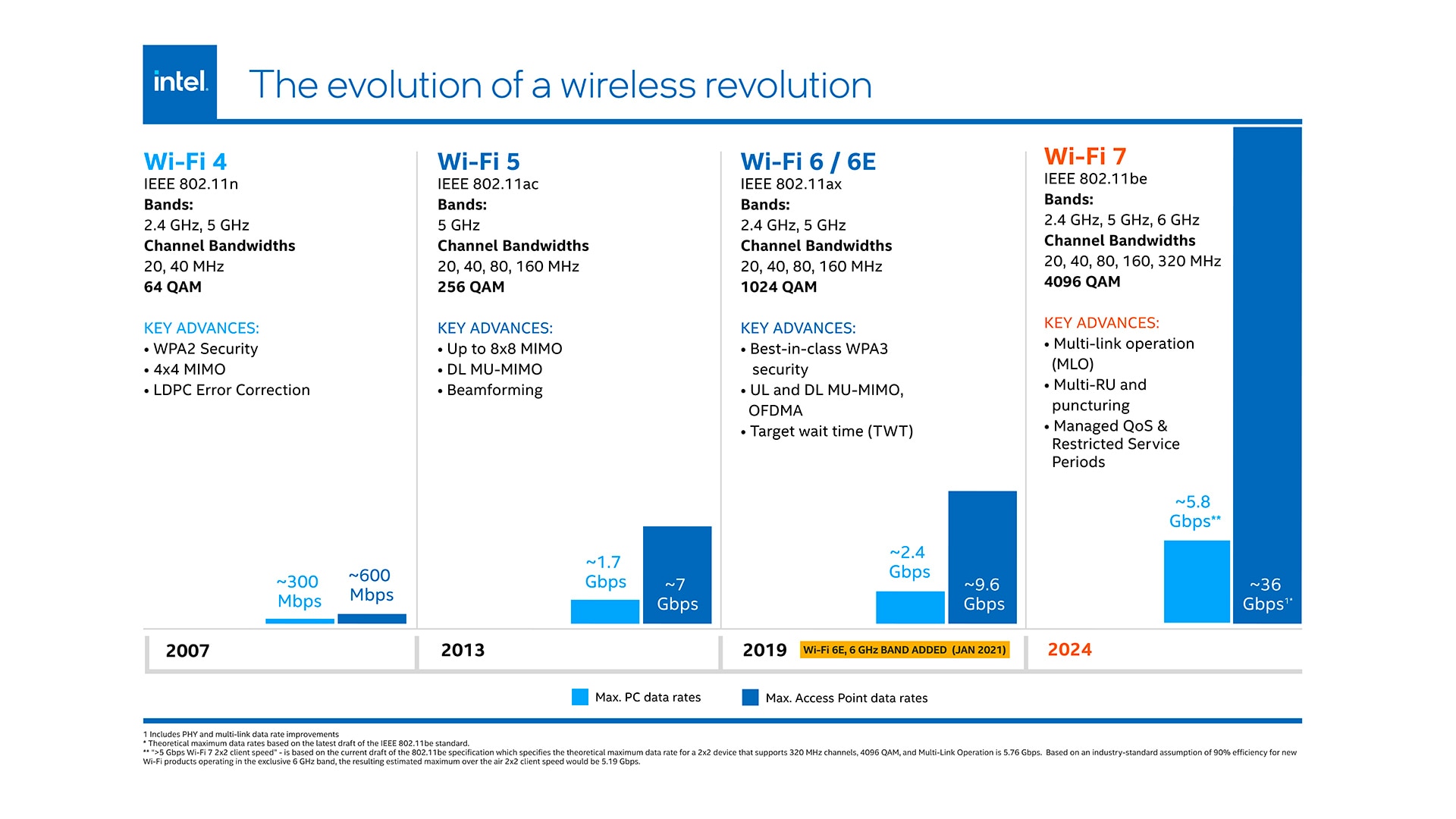
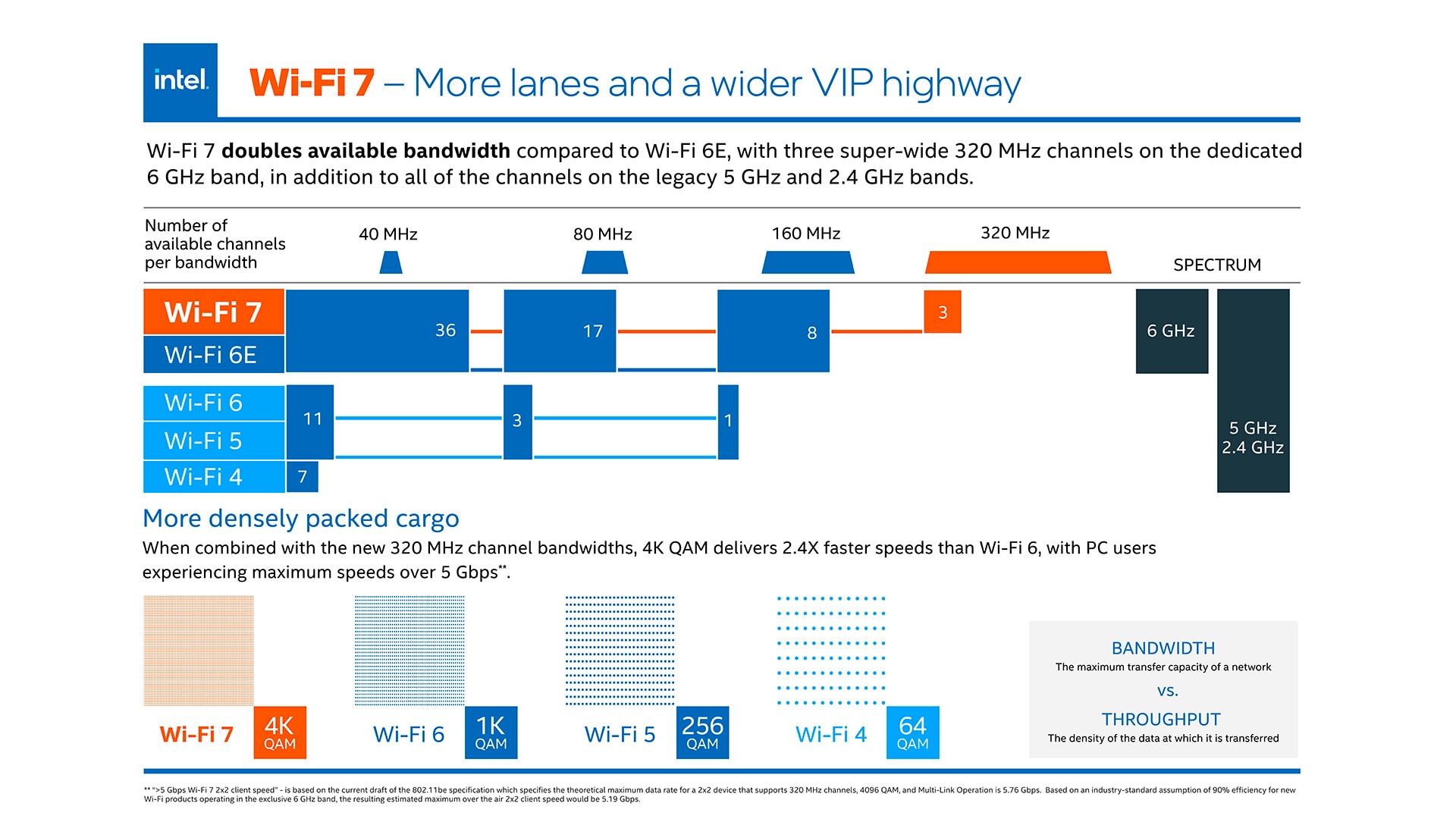
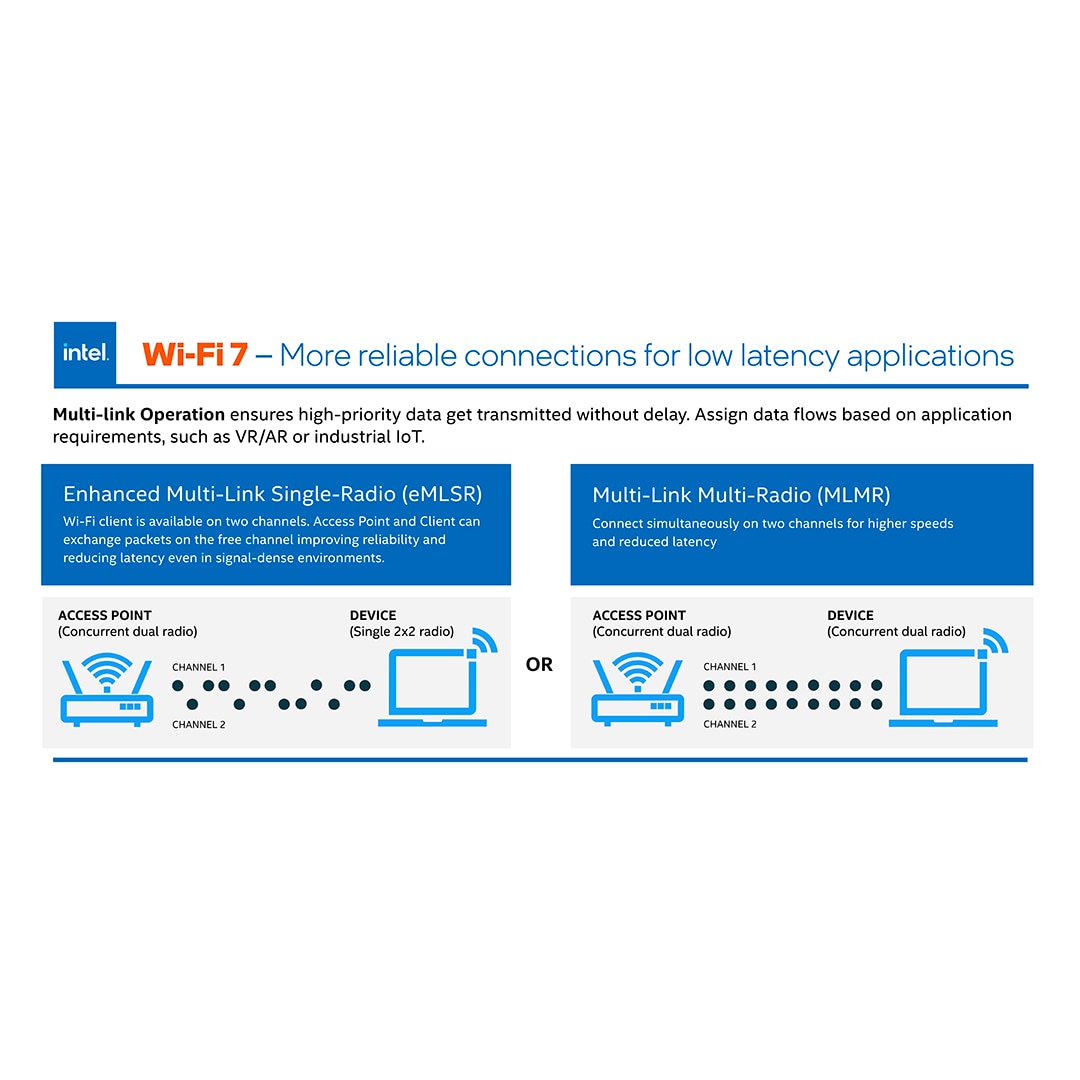
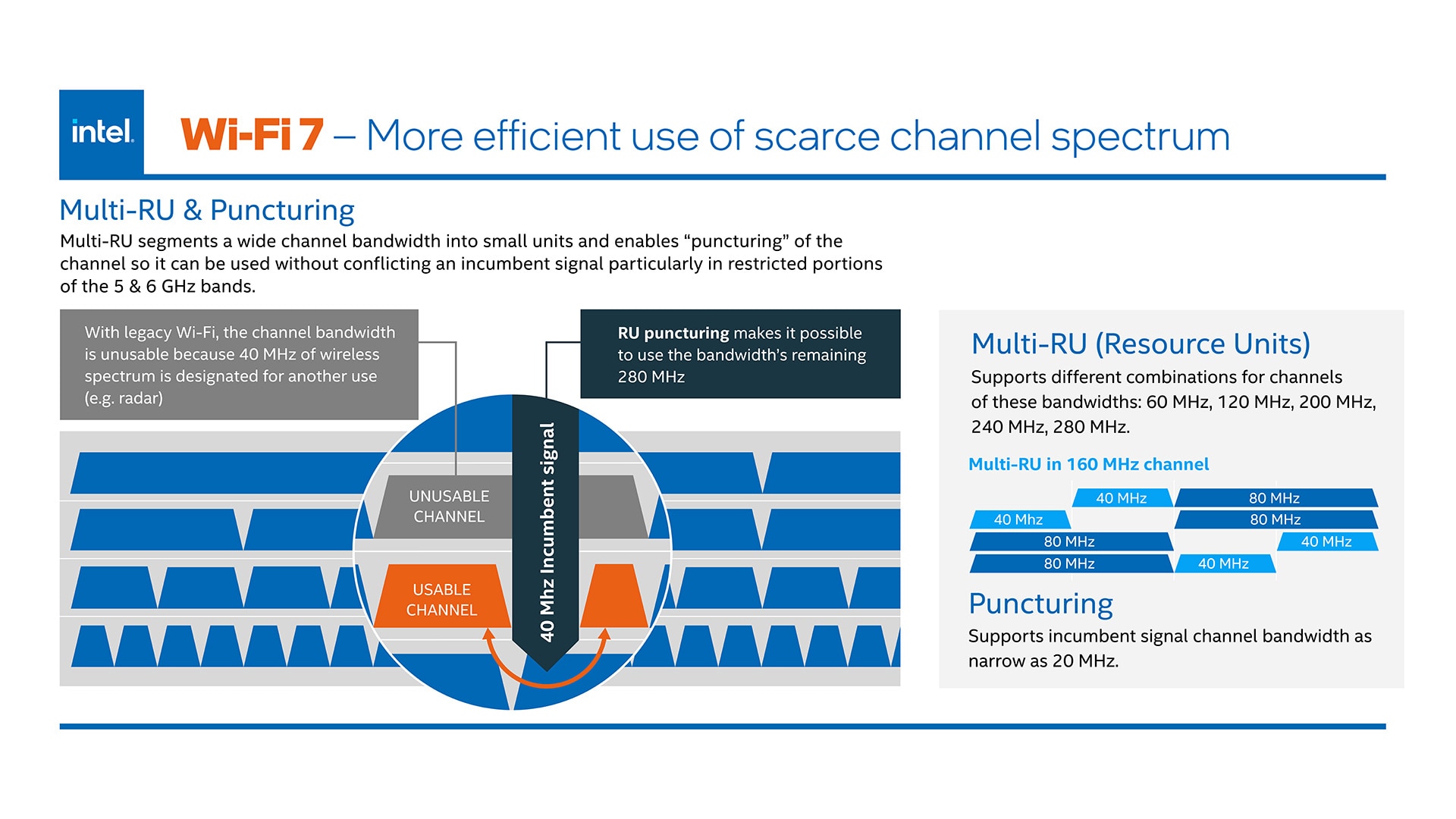
For quite a while now, Intel has been one of the foremost advocates of Wi-Fi 7. So far, both Broadcom and Qualcomm have already announced their Wi-Fi 7 draft-compliant chips for access points and client devices.

Anton Shilov is a contributing writer at Tom’s Hardware. Over the past couple of decades, he has covered everything from CPUs and GPUs to supercomputers and from modern process technologies and latest fab tools to high-tech industry trends.
-
Sleepy_Hollowed Huh, that's quite the interesting thing, hopefully the final specification does not change that much.Reply
I'll wait to jump on using it, though there's a couple of wireless endpoints for home out there that support 6E that look very, very tempting, but not enough to spend enough yet on new NICs for laptops. -
JamesJones44 Wired connections are not going to be obsolete with WiFi 7. 6 Ghz is not great at penetrating walls and has far worse distance issue than 5 Ghz which people have issues with today. It might reduce where you need/want wired connections, but it's not going to make them obsolete.Reply
On the WiFi 7 front, the only feature that is interesting to me is the Multi-Link Operation. However, several router makers have their own proprietary implementations of this and they have never worked as well as promised. I'm hopeful with a standard it will be better than what we have gotten to date, but I'm in the prove it to me camp at the moment. -
spongiemaster ReplyThe Institute of Electrical and Electronics Engineers (IEEE) is expected to adopt the IEEE 802.11be specification only in 2025 formally, so some of its peculiarities might change.
So the specification is expected to be ratified in 2025, but Intel is going to release hardware using it in 2024? Does that mean we're going to see Wi-Fi7 hardware that isn't upgradable to Wi-Fi7e that's released months later like we did with WiFi6? -
ventanni As a low voltage cable technician, I can say with 110% certainty that wired networks aren't going anywhere anytime soon`. That isn't to say that wireless isn't good, it's very good, but it doesn't have the same economics of scale or have the same convenience the way wired networks do. Some factors to consider:Reply
(I'm comparing wired vs wifi7 in a commercial environment because the speed and user number advantage in a residential environment makes no difference when most people have a max 300mb/s connection)
Quality multi-antenna WiFi radios (aka AP's) that you'd actually want to use in a high-user environment aren't cheap.
For a WiFi 7 40GB/s (aggregate) setup, you still need 40GB/s of cabling infrastructure running to it, which also isn't cheap.
Said setup is no longer cost advantageous compared to a wired network.
Only useful for self-powered data connection like a laptop.
Compared to wired networks:
Extremely hyper-optimized for cost, convenience, and installation speed over the last 30-40 years of deployment.
Cat5e and Cat6 cabling is actually good for 2.5gb/s and 5.0gb/s, respectively, out to 100m. As switch and NIC speeds improve, users can passively take advantage of improved speeds.
Dedicated pipe that isn't slowed down by walls, floors, and/or other devices.
Wired cabling can also power devices on the other end (aka POE). This makes it useful for devices such as cameras, phones, sensors, speakers, and even APs.
Environments where wireless has an obvious advantage:
Warehouses
Campgrounds
Stadiums
Anything where you go beyond the 100m limitation of a copper connection, or in buildings with very high ceilings.
Conclusion: Wireless is phenomenally faster and more reliable than it was even 10 years ago, but it lacks the cost, speed, reliability, and isn't as device agnostic like wired networks are. Every office I've installed cabling in is dotted with WiFi units, which are extremely useful for smaller devices and act as backup should a wired connection be in need of repair. That said, anything that improves the cost advantage of a wireless network simultaneously improves the advantage of a wired network, too. -
vern72 I thought 6GHz was reserved for DECT (i.e. cordless) phones. And yes, I still have a cordless phone.Reply -
Sleepy_Hollowed Replyvern72 said:I thought 6GHz was reserved for DECT (i.e. cordless) phones. And yes, I still have a cordless phone.
I thought it was 2.4 GHz, and they can coexist as long as it's set to auto-scan frequency on firmware. You may get lots of interference though if you live in an apartment complex since they just blast pretty far by default (wireless routers using 2.4 that is).
